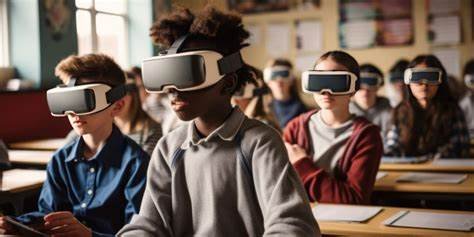Exploring New Digital Frontiers for Fun and Innovation
In the world of education and digital transformation, exploring new experiences is just as important as innovation. For those looking to unwind and enjoy some excitement, playing online roulette real money offers a thrilling way to pass the time. It’s a great example of how entertainment and digital experiences continue to evolve in exciting ways.
Education continues to evolve rapidly, driven by technology and changing societal needs. As we approach 2024, several trends will shape the future of education. From innovative technologies to new teaching methods, these trends will redefine how we learn and teach. Here’s a look at what to expect in the near future.
1. Increased Use of Artificial Intelligence (AI)
Artificial Intelligence (AI) will play a major role in education in 2024. AI can personalize learning experiences, providing tailored content and feedback based on individual student needs. Adaptive learning platforms will use AI to identify strengths and weaknesses, offering targeted support. This technology will help educators better understand student performance and adjust their teaching strategies accordingly.
2. Growth of Virtual and Augmented Reality (VR/AR)
Virtual Reality (VR) and Augmented Reality (AR) will become more prevalent in classrooms. VR can immerse students in historical events, scientific simulations, or artistic experiences, making learning more engaging and interactive. AR can overlay digital information onto the real world, enhancing traditional lessons with interactive elements. These technologies will offer new ways to explore and understand complex concepts.
3. Emphasis on Digital Literacy and Skills
As technology advances, digital literacy will become crucial. Schools will focus on teaching students not just how to use technology, but how to think critically about it. This includes understanding digital citizenship, online safety, and the ethical use of technology. Students will also need skills in coding, data analysis, and digital communication to thrive in the modern workforce.
4. Rise of Hybrid and Remote Learning Models
Hybrid and remote learning models will continue to gain popularity. Schools and universities will blend online and in-person instruction to offer more flexible learning options. This approach allows students to access high-quality education regardless of their location. It also helps accommodate different learning styles and paces, providing a more personalized education experience.
5. Focus on Social-Emotional Learning (SEL)
Social-Emotional Learning (SEL) will be a key component of education in 2024. SEL programs help students develop skills such as empathy, self-awareness, and relationship management. These skills are essential for academic success and personal well-being. Schools will incorporate SEL into their curricula to support students’ emotional and social development alongside their academic growth.
6. Expansion of Competency-Based Education
Competency-Based Education (CBE) will gain traction as an alternative to traditional grading systems. CBE focuses on students mastering specific skills or knowledge areas rather than just completing assignments. Students progress at their own pace, demonstrating their competence through assessments. This approach provides a more personalized and flexible learning experience.

7. Integration of Gamification in Learning
Gamification will enhance educational experiences by incorporating game elements into learning activities. This includes earning badges, completing levels, and competing in challenges. Gamification can make learning more engaging and motivate students to participate actively. It also helps develop problem-solving skills and encourages a growth mindset.
8. Increased Emphasis on Lifelong Learning
The concept of lifelong learning will become more important. As the job market evolves, individuals will need to continuously update their skills. Educational institutions will offer more opportunities for adult education and professional development. Online courses, workshops, and certifications will help people stay current in their fields and explore new career paths.
9. Sustainable and Green Practices in Education
Sustainability will influence educational practices and campus designs. Schools will adopt green building standards, reduce waste, and promote environmental awareness. Curriculum will include topics on sustainability and climate change, preparing students to address global challenges. This focus on environmental responsibility will reflect a broader commitment to creating a sustainable future.
10. Greater Collaboration and Community Engagement
Schools will increasingly engage with communities and foster collaborative learning environments. Partnerships with local businesses, organizations, and institutions will enrich educational experiences. Projects and internships will provide real-world applications of classroom learning. This collaboration will help bridge the gap between education and the workforce, preparing students for future careers.
Final Thoughts
The future of education in 2024 will be shaped by technological advancements, new teaching methods, and a focus on holistic learning. Embracing these trends will lead to more personalized, engaging, and effective educational experiences. As we move forward, staying informed about these changes will help students, educators, and institutions adapt and thrive in a rapidly evolving educational landscape

